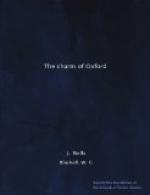Wykeham’s scholars all came from Winchester, and were supposed to be pauperes, but as one of the first, Henry Chichele, afterwards Henry V’s Archbishop of Canterbury and the Founder of All Souls’, was a son of the Lord Mayor of London, it is obvious that the qualification of “poverty” was interpreted with some laxity. It was not until the middle of the nineteenth century that others than Wykehamists were admitted as scholars.
The fact that a mere boy was elected to a position which provided for him for life was not calculated to stimulate subsequent intellectual activity, and Wykehamists themselves have been among the first to say that the intellectual distinction of the great bishop’s beneficiaries has by no means corresponded to the magnificence of the foundation or the noble intentions of the Founder. Antony Wood records in the seventeenth century that there was already an “ugly proverb” as to New College men—“Golden scholars, silver Bachelors, leaden Masters, wooden Doctors,” “which is attributed,” he goes on, “to their rich fellowships, especially to their ease and good diet, in which I think they exceed any college else.”
The nineteenth century has changed all this; the small and close college of pre-Commission days has become one of the largest and most intellectual in the University; but Winchester men in their Oxford college fully hold their own in every way against the scholars from the world outside, who are now admitted to share with them the advantages of Wykeham’s foundation.
The bishop’s careful provision, however, of good teaching at his school and in his college bore good fruit at first, whatever may have been the result later. If Corpus is especially the college of the revival of learning, New College had prepared the way, and the first Englishman to teach Greek in Oxford was the New College fellow, William Grocyn, whom Erasmus called the “most upright and best of all Britons.” From the same college, about the same time, came the patron of Erasmus, Archbishop Warham, of whose saintly simplicity and love of learning he gives so attractive a picture. Warham was not forgetful of his old college, and presented the beautiful “linen fold” panelling which still adorns the hall.
At the time of the Reformation, New College was especially attached to the old form of the faith, and it has been maintained that the dangerous lowness of the wicket entrance in the Gate Tower was due to the deliberate purpose of the governing body, who resolved that everyone who entered the college, however Protestant his views, should bow his head under the statue of the Blessed Virgin above. At any rate, one New College man in the seventeenth century attributed his perversion to “the lively memorials of Popery in statues and pictures in the gates and in the chapel of New College.”




